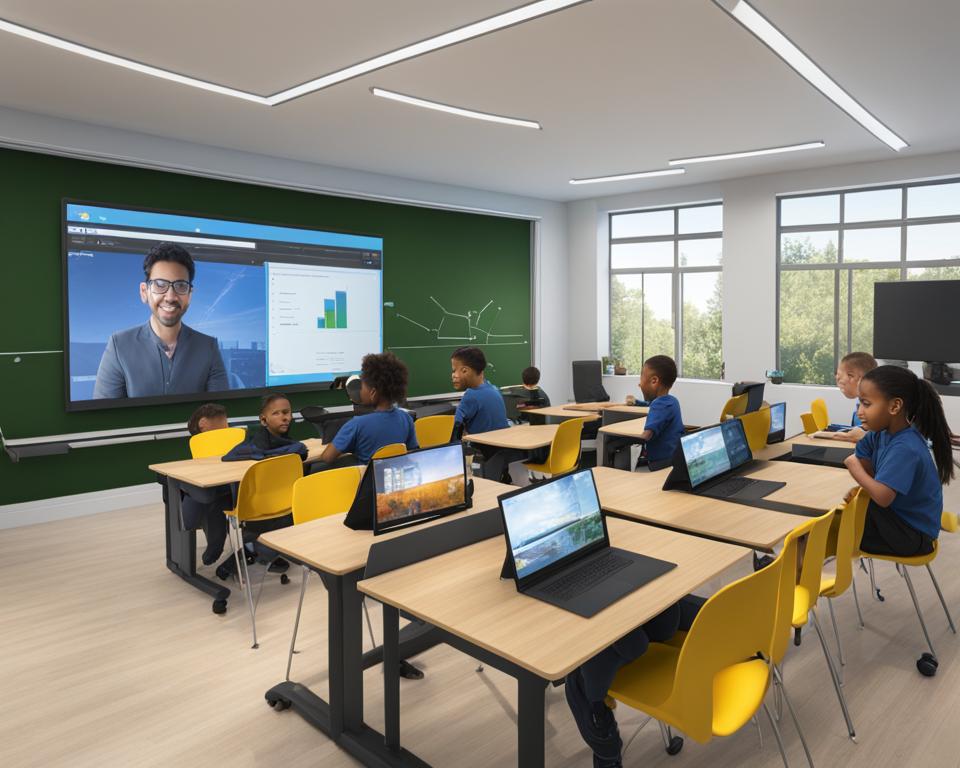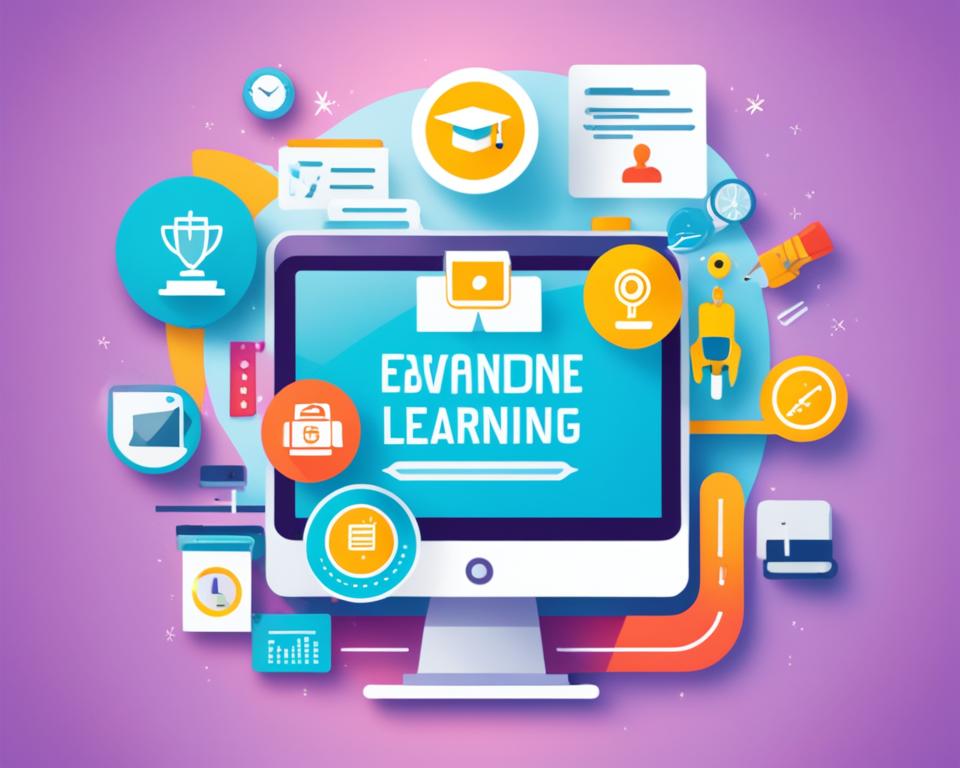Online education, also known as online learning, has become increasingly popular in recent years. It refers to the process of acquiring knowledge and learning through virtual platforms and the internet. With the advent of technology, students now have the option to access educational materials, participate in virtual classrooms, and interact with teachers and peers without the need for physical attendance.
So how does online education work? Well, it involves a combination of multimedia lectures, interactive assignments, and online discussions to facilitate learning. Students can access course materials at their convenience, learn at their own pace, and engage in virtual classrooms to interact with teachers and classmates. Through the use of online learning platforms, students can access a wide range of courses and programs, explore diverse subjects, and enhance their skills.
Online education provides flexibility and convenience, enabling students to learn from anywhere and at any time. It eliminates geographical barriers and allows learners to access quality education regardless of their location. This flexibility is particularly beneficial for individuals who have other commitments, such as work or family responsibilities, as it allows them to balance their studies with their daily lives.
With online education, the learning process becomes more personalized. Students can progress at their own pace, engage with tailored resources, and receive individualized attention from teachers through virtual channels. This personalized learning approach caters to different learning styles and allows students to optimize their learning experience.
Overall, online education has revolutionized the way people learn and acquire knowledge. It provides flexibility, convenience, and a personalized learning experience. By utilizing online learning platforms and resources, students can access quality education, enhance their skills, and achieve their academic goals.
Key Takeaways:
- Online education allows students to access educational materials and learn through virtual platforms and the internet.
- Online education provides flexibility and convenience, enabling students to learn from anywhere at any time.
- Online learning offers personalized learning experiences, allowing students to progress at their own pace and engage with tailored resources.
- Online education eliminates geographical barriers, enabling access to quality education regardless of location.
- By utilizing online learning platforms and resources, students can enhance their skills and achieve their academic goals.
Benefits of Online Learning
Online learning offers numerous benefits and advantages for students. Whether they are pursuing a degree, enhancing their skills, or exploring new subjects, online education provides a flexible and convenient approach to learning. Here are some key benefits of online education:
- Flexibility in Scheduling: Online learning allows students to create a personalized study schedule that fits their individual needs and commitments. They can choose when and where to study, enabling them to balance work, family, and other responsibilities effectively.
- Access to Quality Education Anywhere: One of the significant advantages of online education is the elimination of geographical barriers. Students can access top-notch educational programs and courses from renowned institutions, regardless of their location. This opens up opportunities for individuals who may not have access to traditional educational resources.
- Personalized Learning Experience: Online education promotes personalized learning, allowing students to progress at their own pace. They can review and revisit course materials as needed, ensuring a thorough understanding of the subjects. Additionally, online platforms often offer tailored resources and interactive activities that cater to different learning styles.
- Diverse Course Offerings: Online learning platforms provide a wide range of courses and programs, covering various disciplines and subjects. Students have the opportunity to explore their interests, develop new skills, and broaden their knowledge base. Whether they are interested in business, technology, healthcare, or the humanities, there is an online course available to suit their needs.
As online education continues to evolve and improve, it offers students a wealth of opportunities to achieve their educational goals. The flexibility, accessibility, and personalized learning experience make online learning an excellent choice for individuals seeking quality education.
How Online Classes Work
Online classes provide students with the opportunity to learn and engage in educational activities through virtual platforms and distance education methods. These virtual classrooms simulate the experience of a traditional classroom, allowing students and teachers to interact in real-time.
Within virtual classrooms, various online tools and platforms are utilized to facilitate effective learning. Features such as video conferencing, chat functions, and screen sharing enable students to join live lectures, participate in discussions, and ask questions, fostering an interactive and engaging learning environment.
Distance education is facilitated through online platforms, where teachers upload course materials, assignments, and resources. Students can access these materials at their own pace and complete assignments using the e-learning platform. Subsequently, they can submit their work online, ensuring seamless communication between students and teachers.
With the flexibility and accessibility offered by virtual classrooms and distance education, students have the freedom to learn from anywhere, at any time. This e-learning approach promotes self-paced learning, enabling students to tailor their studies to their individual needs and preferences.
To further illustrate the dynamics of online classes, consider the example below:

| Virtual Classroom Features | Benefits |
|---|---|
| Video Conferencing | Enables real-time interaction with teachers and peers |
| Chat Functions | Facilitates instant communication and collaboration |
| Screen Sharing | Allows teachers to share visual content and presentations |
| Course Materials | Accessible at any time, allowing self-paced learning |
| Online Assignments | Provides a platform for submitting work and receiving feedback |
Through the virtual classroom experience, students can actively participate in their education, connect with teachers and peers, and access resources to enhance their learning journey. The combination of virtual classrooms and distance education enables a flexible and effective mode of education that adapts to the needs and schedules of students.
Online Learning Tools and Resources
Online learning platforms provide a variety of tools and resources to enhance the learning experience. One key resource is the Online Learning System (OLS), which serves as a centralized hub for accessing lessons, assignments, and resources. Through the OLS, students can easily navigate their courses, track their progress, and submit assignments. This system ensures that the curriculum is organized and readily available for students to access at their convenience.
The curriculum itself is presented in a comprehensive and engaging manner. It includes a combination of live online instruction, ready-made videos, self-paced assignments, interactive quizzes, and offline activities. This diverse blend caters to different learning styles and promotes active participation. The use of multimedia elements such as videos, images, and interactive simulations creates an immersive learning experience that grabs students’ attention and fosters deeper understanding.
In addition to the curriculum, online learning platforms offer various features to facilitate interaction and collaboration. Students can engage in discussions with their peers, post on message boards, and participate in virtual study groups. These collaborative tools encourage student engagement, enabling them to share ideas, ask questions, and benefit from collective knowledge.
Interactive Quizzes
Interactive quizzes are a valuable tool in online learning. They help assess students’ understanding of the material and provide immediate feedback, allowing them to track their progress and identify areas for improvement. The quizzes are designed to be both educational and enjoyable, with interactive elements that make the learning process more engaging.
| Benefits of Interactive Quizzes: |
|---|
| 1. Reinforce learning: |
| Interactive quizzes allow students to review and reinforce what they’ve learned in a fun and interactive way. By answering questions and receiving immediate feedback, students can solidify their understanding of the material. |
| 2. Identify knowledge gaps: |
| Quizzes help students identify areas where they may have gaps in their knowledge. By pinpointing these areas, students can focus their efforts on improving their understanding of specific concepts. |
| 3. Assess progress: |
| Interactive quizzes provide a way for students to assess their progress and track their learning journey. By regularly taking quizzes, students can measure their growth and see how far they’ve come. |
| 4. Increase engagement: |
| The interactive nature of quizzes makes the learning process more engaging and enjoyable. Students are motivated to actively participate and challenge themselves, leading to better retention of information. |
These interactive quizzes are designed to be accessible and user-friendly. They often feature a variety of question formats, including multiple choice, fill in the blanks, and matching. This diversity ensures that students are exposed to different types of questions, promoting a well-rounded understanding of the subject matter.
Overall, the wide range of online learning tools and resources, including the Online Learning System, curriculum materials, and interactive quizzes, enhance the learning experience for online students, making education more accessible, engaging, and effective.
Day in the Life of an Online Student
Online students experience a structured daily routine that revolves around virtual classes, interactive activities, offline engagements, and the guidance of a Learning Coach. Let’s take a closer look at what a typical day looks like for an online student.
Attending Virtual Classes
Virtual classes are the core of online education, offering students the opportunity to engage with their teachers and classmates in real-time. Through video conferencing platforms, students join online lectures, participate in discussions, and ask questions, just like in a traditional classroom. This interactive learning experience fosters collaboration and active participation.
Completing Interactive Activities and Assignments
The Online Learning System provides a central hub for students to access course materials, interactive activities, and assignments. Students work through multimedia resources, interactive quizzes, and engaging assignments that promote critical thinking and knowledge retention. The use of technology enhances the learning experience and caters to diverse learning styles.
Engaging in Offline Activities
Online education recognizes the importance of offline activities for a well-rounded learning experience. Students have the opportunity to engage in offline activities using provided materials, such as conducting experiments, practicing hands-on skills, or completing projects. These activities offer practical application and reinforce the concepts learned in virtual classes.

Interacting with Teachers and Classmates
Through online channels, students can interact with their teachers and classmates beyond virtual class sessions. They can seek clarification, discuss assignments, or collaborate on group projects through messaging platforms or discussion forums. The online environment fosters communication and connectivity, creating a sense of community among students.
Participating in Extracurricular Activities and Clubs
Online education offers a range of extracurricular activities and clubs that cater to students’ diverse interests and passions. Students can join virtual clubs, participate in online competitions, or take part in virtual events and workshops. These activities promote social interaction, leadership development, and the exploration of personal hobbies and talents.
The Role of a Learning Coach
Throughout the online education journey, a Learning Coach plays a vital role, typically fulfilled by a parent or guardian. The Learning Coach provides support, guidance, and accountability to the student. They help establish a productive learning environment, set goals, monitor progress, and ensure that the student remains motivated and focused on their studies.
Overall, the day in the life of an online student is dynamic, combining interactive virtual classes, offline activities, and the support of a Learning Coach. This comprehensive approach to learning allows students to achieve academic success while developing essential skills for the digital age.
Online Learning vs. Traditional Learning
Online learning and traditional classroom learning have distinct differences in terms of delivery method and flexibility. While traditional learning requires physical attendance in a classroom, online learning offers the flexibility for students to access educational materials and interact with teachers and peers virtually.
Online learning provides students with the freedom to learn at their own pace and from anywhere with internet access. This flexibility allows individuals to balance their studies with other commitments, such as work or personal responsibilities. Students can access course materials, participate in virtual classrooms, and engage in online discussions without the constraints of a physical classroom.
One of the key advantages of online learning is the flexibility it offers in terms of scheduling. Students have the ability to create a personalized learning environment that fits their individual needs and preferences. Whether it’s early morning or late at night, learners can access their courses and study materials when it’s most convenient for them. This flexibility allows students to manage their time effectively and adapt their learning schedule to accommodate other commitments in their lives.
However, traditional learning provides face-to-face interaction and a structured environment that some students may prefer. Interacting with teachers and classmates in person can foster collaborative learning and facilitate immediate feedback. In a traditional classroom setting, students can engage in discussions, ask questions, and receive hands-on guidance from their teachers.
It’s important to note that both online learning and traditional classroom learning have their own unique advantages and disadvantages. The choice between the two depends on the individual’s learning style, preferences, and specific circumstances.
How to Succeed in Online Classes
Succeeding in online classes requires effective time management skills and strong study habits. Students must prioritize their studies and create a well-structured schedule to manage their time efficiently. By allocating dedicated time for studying, completing assignments, and participating in virtual classes, students can stay on track and meet their academic goals.
Developing effective study skills is crucial for online learners. Taking organized notes, setting goals, and practicing active reading are essential techniques that can enhance comprehension and retention of course materials. Additionally, seeking clarification when needed is important to fully understand concepts and address any doubts or confusion.
Effective Study Skills for Online Learners:
- Take organized notes: Summarize key points, underline important information, and create a system for organizing notes that works best for you. This will make studying and reviewing material more efficient.
- Set goals: Break down larger tasks into smaller, manageable goals. This will help you stay motivated and focused, as you can work towards specific milestones throughout the course.
- Seek clarification: Don’t hesitate to reach out to your instructors or classmates when you have questions or need further explanation. Utilize discussion forums or online office hours to engage with others and gain a deeper understanding of the subject matter.
Online resources play a pivotal role in supporting successful online learning. Students can take advantage of online libraries, academic support services, and discussion forums to supplement their studies. Online libraries provide access to a vast array of digital resources, including research articles, e-books, and scholarly databases. Academic support services offer tutoring, writing assistance, and study resources to help students excel in their coursework. Engaging in discussion forums allows students to connect with peers, share insights, and collaborate on assignments.
By implementing effective time management strategies, honing study skills, and utilizing online resources, students can overcome the unique challenges of online learning and succeed in their academic endeavors.
How Online Exams Work
Online exams have become an integral part of the online education system. They provide students with a convenient and flexible way to assess their understanding of the course material. Online exams can take various formats, catering to different types of assessments and learning objectives.
One common format of online exams is the open book test. In this format, students are allowed to refer to their course materials, such as textbooks or lecture notes, while answering the questions. Open book tests assess students’ ability to find and apply relevant information.
Another format is simulations, which are commonly used in practical subjects like computer programming or medical training. Simulations allow students to apply their knowledge in real-world scenarios, helping them develop hands-on skills and problem-solving abilities.
Multiple-choice tests are widely used in online exams. Students are presented with a question and a set of answer options, and they need to select the correct one. Multiple-choice tests assess students’ comprehension and critical thinking skills.
Timed exams are another format where students are required to complete the exam within a specified time limit. This format tests students’ ability to manage their time effectively and make decisions under pressure.
It is important to note that some online exams may be proctored. Proctored exams involve additional measures to ensure exam integrity. Students may need to visit a designated testing site or have their exams monitored remotely through webcam and software.
Professors usually communicate the exam format and requirements in advance, along with clear instructions on how to complete and submit the exams. This allows students to prepare accordingly and perform their best during the online exams.
“Online exams provide students with a flexible and accessible way to demonstrate their understanding of the course material.” – John Smith, Professor of Online Education
Online Education Resources and Support
Online education institutions understand the importance of providing students with comprehensive resources and support services to ensure their success throughout their academic journey. These institutions offer a range of services and assistance to help students navigate their online learning experience effectively.
Academic Advisors
One valuable resource available to online students is academic advisors. These advisors play a crucial role in guiding students in course selection, registration, and overall academic planning. They are knowledgeable about the curriculum and can provide personalized recommendations to help students make informed decisions about their educational path. Whether it’s choosing the right classes or discussing career goals, academic advisors are there to provide guidance and support.
Enrollment Counselors
To facilitate the application and admissions process, online education institutions often have dedicated enrollment counselors. These professionals are well-versed in the enrollment requirements and procedures, assisting prospective students with their applications, required documentation, and any questions or concerns they may have throughout the process. Enrollment counselors ensure a smooth transition for students entering the online education system.
Online Student Services
Online student services are another essential component of the support system provided by online education institutions. These services offer technical support, ensuring that students can navigate the online learning platform and troubleshoot any technical issues they may encounter. Additionally, online student services provide access to online libraries and research materials, granting students the necessary resources to excel in their studies.
Furthermore, online student services often organize virtual events, discussion boards, and webinars to create a sense of community and connection among students. These platforms enable students to engage with their peers and faculty members, fostering collaborative learning and the opportunity to expand their network.
| Online Education Resources and Support | Description |
|---|---|
| Academic Advisors | Provide guidance in course selection and academic planning. |
| Enrollment Counselors | Assist with the application and admissions process. |
| Online Student Services | Offer technical support, access to online libraries, and create a sense of community. |
Overall, online education institutions prioritize students’ success and well-being by offering a diverse range of resources and support services. Whether it’s academic guidance, enrollment assistance, or technical support, these resources are designed to empower students and ensure a positive learning experience. By leveraging these resources, online students can thrive in their academic journey.

Conclusion
Online education has completely revolutionized the way people learn and acquire knowledge. With the advancement of technology, learners now have the ability to access high-quality education from anywhere and at any time through online platforms. The flexibility and convenience offered by online education make it an appealing choice for many students.
By utilizing the various tools and resources available, students can make the most out of their online education experience. However, it is crucial to note that online learning demands self-motivation, effective time management, and strong study skills in order to succeed. Students must be proactive in seeking support and guidance, utilizing available resources and support services to enhance their learning journey.
In conclusion, online education opens up a world of opportunities for learners, providing them with the means to expand their knowledge and skills. With dedication, discipline, and access to the right resources, students can excel in their online education endeavors. As technology continues to evolve, online education will continue to play a significant role in shaping the future of learning.
FAQ
What is online education, and how does it work?
Online education refers to the process of learning and acquiring knowledge through virtual platforms and the internet. It allows students to access educational materials, participate in virtual classrooms, and interact with teachers and peers without the need for physical attendance. Online education provides flexibility and convenience, enabling students to learn from anywhere at any time. It typically involves a combination of multimedia lectures, interactive assignments, and online discussions to facilitate learning.
What are the benefits of online learning?
Online learning offers several advantages for students. It provides flexibility in terms of scheduling, allowing learners to balance their studies with other commitments. It eliminates geographical barriers, enabling access to quality education regardless of location. Online education also promotes personalized learning, as students can progress at their own pace and engage with tailored resources. Additionally, online learning platforms often offer a wide range of courses and programs, allowing students to explore diverse subjects and enhance their skills.
How do online classes work?
Online classes are conducted through virtual classrooms, where students and teachers interact in real-time using various online tools and platforms. These virtual classrooms simulate the experience of a traditional classroom, with features such as video conferencing, chat functions, and screen sharing. Students can join live lectures, participate in discussions, and ask questions. Distance education is facilitated through online platforms, where teachers upload course materials, assignments, and resources. Students can access these materials at their own pace, complete assignments, and submit them online.
What tools and resources are available for online learning?
Online learning platforms provide a variety of tools and resources to enhance the learning experience. These include the Online Learning System (OLS), which serves as a centralized hub for accessing lessons, assignments, and resources. The curriculum is presented through a combination of live online instruction, ready-made videos, self-paced assignments, interactive quizzes, and offline activities. Students can engage in discussions, post on message boards, and participate in extracurricular activities to supplement their learning. The use of multimedia and interactive materials caters to different learning styles and promotes engagement.
Can you describe a typical day in the life of an online student?
Online students follow a structured daily routine that includes attending scheduled virtual classes, completing interactive activities and assignments through the Online Learning System, and engaging in offline activities using provided materials. They also have the opportunity to interact with teachers and classmates through online channels and participate in extracurricular activities and clubs. The role of a Learning Coach, usually a parent or guardian, is crucial in providing support and guidance throughout the online education process.
What is the difference between online learning and traditional learning?
Online learning differs from traditional classroom learning primarily in terms of delivery method and flexibility. While traditional learning requires physical attendance in a classroom, online learning allows students to access educational materials and interact with teachers and peers virtually. Online learning offers more flexibility in terms of scheduling, as students can learn at their own pace and from anywhere with internet access. However, traditional learning provides face-to-face interaction and a structured environment that some students may prefer.
How can students succeed in online classes?
Succeeding in online classes requires effective time management skills and strong study habits. Students should create a schedule and allocate dedicated time for studying, completing assignments, and participating in virtual classes. Developing effective study skills, such as taking organized notes, setting goals, and seeking clarification when needed, is essential. Online resources, such as online libraries, academic support services, and discussion forums, offer additional support for online learners.
How do online exams work?
Online exams can take various formats, including open book tests, simulations, multiple-choice tests, and timed exams. Some exams may be proctored, where students may need to visit a designated testing site or have their exams monitored remotely through webcam and software. Exam formats and requirements are typically communicated by the professors in advance, and students are provided with clear instructions on how to complete and submit their exams.
What resources and support are available for online education?
Online education institutions provide a wide range of resources and support services to assist students throughout their academic journey. These include academic advisors who guide students in course selection and registration, enrollment counselors who assist with the application and admissions process, and online student services that offer technical support and access to online libraries and research materials. Students can also engage in virtual events, discussion boards, and webinars to connect with peers and faculty members.
How has online education revolutionized the learning experience?
Online education has revolutionized the way people learn and acquire knowledge. With the advancement of technology, learners can access quality education from anywhere and at any time through online platforms. The flexibility and convenience of online education, combined with the various tools and resources available, make it an attractive option for many students. However, it is important to note that online learning requires self-motivation, effective time management, and strong study skills to succeed. By utilizing the available resources and support services, students can make the most of their online education experience.





